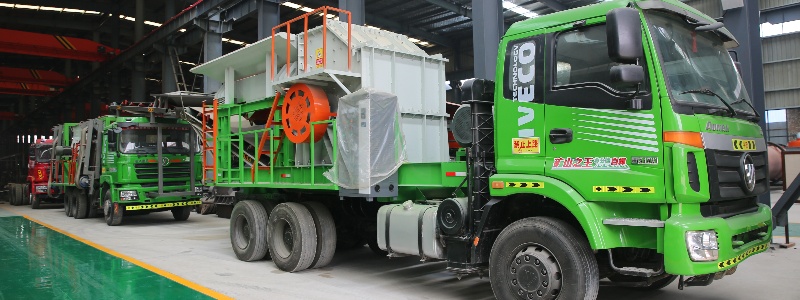Construction waste is mainly composed of broken bricks, concrete blocks, waste steel bars, etc., to achieve the reuse of construction waste has to mention the mobile crusher.
Mobile crusher equipment is an innovative equipment, which has become an important tool in the field of construction waste treatment with its unique advantages and wide application fields.
The characteristics and advantages of mobile crusher:
1.Flexible mobility
The mobile crusher uses a wheeled or tracked chassis, enabling it to move freely between different work sites and disposal locations while adapting to various working environments.
2.efficient crushing ability
Advanced crushing technology efficiently breaks down and separates construction waste. The mobile crusher performs exceptionally well in separating steel bars from construction waste. Its belt conveyor system features built-in iron removal functionality that automatically extracts steel reinforcement from the waste. Workers feed construction waste into the mobile crusher's inlet. The crusher breaks the coarse material into smaller pieces while bending any steel reinforcement. The crushed material and bent steel bars discharge together through the outlet. An iron remover then extracts the steel bars from the waste stream. Finally, a side belt conveyor discharges the separated steel bars. The main belt conveyor transports the small pieces into the second-stage fine crushing system, completing the steel bar separation process successfully.
3.environmental protection,and energy-saving
It uses a closed design to effectively reduce dust and noise emissions. Reusing construction waste reduces natural resource consumption.
4.wide applicability in application field
Construction crews can deploy it at building sites, urban demolition projects, and municipal environmental cleanup operations. On construction sites, mobile crushing equipment can break and reuse waste concrete, bricks, stone and other construction waste, reducing the stacking and transportation costs of waste materials. In the urban demolition project, it can break and separate the dismantled building materials, and turn the waste materials into reusable resources. Urban environmental protection management projects can use mobile construction waste crushers to process city construction waste and reduce environmental pollution from discarded materials.
5.Multiple cost savings
The mobile crusher station features an integrated assembly and compact fuselage structure. Its small footprint eliminates the need for pile driving or cement foundation construction. This design significantly reduces capital infrastructure costs. Mobile crusher with stop, flexible transfer, no truck to transport raw materials back and forth, can save transportation costs.
The mobile crushing station features a PLC intelligent control system that remotely monitors each equipment’s operation in real time. Its fully automated production process runs continuously without manual stops or adjustments. Only 1 to 2 people can control the production, which can save labor costs. The simple and convenient fuselage assembly enables quick deployment, saving installation time. Its built-in generator eliminates dependence on urban power grids, preventing downtime from blackouts to ensure continuous production and higher work efficiency.

In short, mobile crusher with its flexible mobility, efficient crushing capacity, environmental protection and energy saving characteristics and a wide range of applications, has become an important equipment in the field of construction waste treatment. Construction waste is widely distributed and highly scattered. Mobile crushers require no infrastructure—they can drive directly to the site and start production immediately. They offer flexible transfer, compact size, and full-unit integration. A mobile jaw crusher combined with a mobile impact crusher provides complete crushing functions, including feeding, crushing, iron removal, screening, and transportation. Though slightly more expensive than fixed crushing stations, mobile crushers deliver greater long-term benefits. They serve as powerful, profit-generating tools for construction waste treatment plants.

 whatsApp
whatsApp